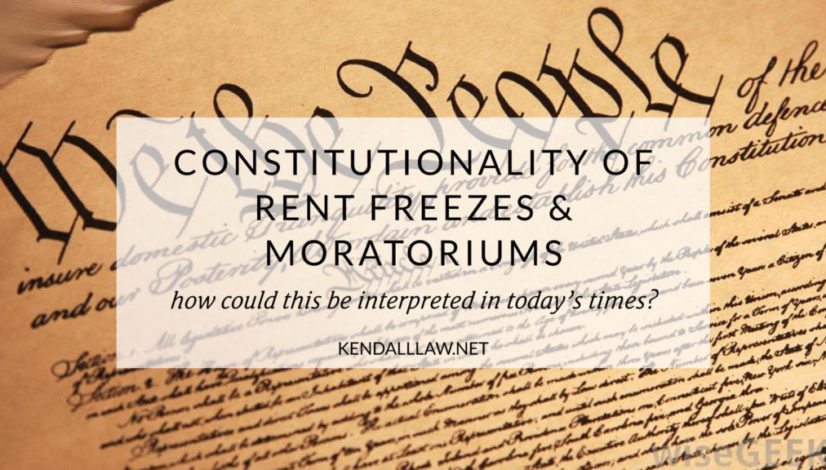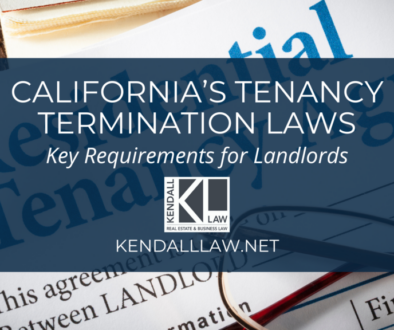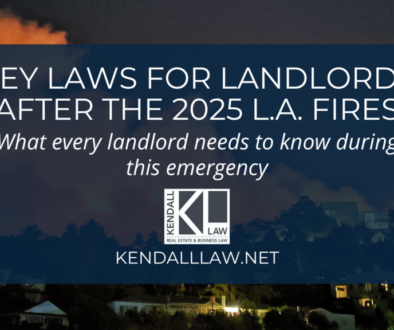The constitutionality of rent freezes and moratoriums
The coronavirus has devastated California’s economy. Governor Gavin Newsom labeled the state’s economic crisis a “pandemic-induced recession,” after 3.1 million people filed for unemployment last month. The unemployment rate in California is now at 5.3%, the largest rate increase on record since 1976, when state officials first began using the current record for tracking job losses. Newsom added that the real percentage of unemployed individuals is actually much higher, since the tracking system fails to take into account underemployed workers or gig workers. Newsom vowed to help California recover from the recession via the creation of the Governor’s Task Force on Business and Jobs Recovery.
This is not the first time that Newsom has interceded in order to stem the devastation of COVID-19. On March 27, 2020, the governor issued an executive order banning the enforcement of eviction orders for renters through May 31, 2020. The order bans residential landlords from evicting tenants for nonpayment of rent and prohibits eviction by law enforcement or courts. The tenant is required to declare in writing, no more than seven days after the rent comes due, that she or he cannot pay all, or a part of their rent due to COVID-19. Should a tenant defer payment of her or his rent, she or he remains obligated to repay the rent in full after May 31 and could still face eviction once the moratorium is lifted. While tenant groups consider the order a significant victory, many landlords who depend upon the rental income, are left in a precarious position. Aside from the practicalities of Newsom’s order, the constitutional issue of whether the governor’s use of power constitutes a permissible “Taking” under the 5th and 14th amendments to the Constitution, may be questionable.
There is no doubt that Governor Newsom’s Order took advantage of the broad constitutional powers that governors retain to halt evictions during emergencies. However, one action cannot be examined in isolation. A reprieve in rent payments must also consider methods to ease the burden on landlords. The provision being examined to provide relief for landlords is, deferring payment of their mortgages, i.e. a rent jubilee. Many experts caution that any sustained suspension of rent and mortgage payments would result in grave consequences for our economy. Carol Galante, faculty director for the Terser Center for Housing Innovation at the University of California, Berkeley, explains, “Those mortgages are often securitized. They’re packed up into bonds and they’re sold as investments, and those investors are expecting a certain interest payment off of those securities on an ongoing basis. If they don’t get those, then those investors suffer… So you say, well, who cares about the investors? But the fact is that many of those investors are things like pension funds.” These pensions benefit teachers, first responders and others, in ways that may not be immediately apparent.
There are additional questions about the constitutionality of a rent jubilee. A lease agreement in California is a contract made between a landlord and a tenant pertaining to the renting of real property. The agreement is formed when there is a “meeting of the minds” as to the terms and conditions of the contract (also known as mutual assent). When Governor Newsom changed the terms of the lease agreement, he made a unilateral modification to the contract. Some opponents to his order argue that his actions rendered the lease meaningless because there was no “meeting of the minds” as to an essential term (i.e. payment). In addition, opponents to these rent freezes and moratoriums assert that they violate the “Takings Clause” of the Fifth and Fourteenth Amendments to the Constitution. The Takings Clause provides that “private property [shall not] be taken for public use without just compensation.” While the Fifth Amendment by itself applies only to actions taken by the federal government, the Fourteenth Amendment extends the Takings Clause to actions taken by state and local governments as well. Consequently, the question becomes, should these rent freezes be compensated by the government? This examination requires us to consider whether landlords are entitled to any relief due to their loss of income. It is highly unlikely that the government’s broad exercise of its “police power” would constitute a Taking. The relevant precedent in this examination is the 1978 decision in Penn Central. The Penn Central decision laid out a three factor test for determining whether a government act was a “Taking:” (1) the economic impact of the regulation in question; (2) whether, and to what extent, the owner suffered the loss of “investment-backed” expectations; and (3) the “character” of the government action (i.e., if the government physically occupied or damaged the property in question, it is more likely to be considered a Taking).
In light of the Penn Central factors and the fact that the “Taking” is only temporary, it is highly unlikely that a court would consider the rent freeze and moratorium by Governor Newsom to be a constitutional violation. Additionally, given the enormous economic losses caused by COVID-19 and the fact that many people are living paycheck to paycheck, any judge would be reticent to issue a ruling against a struggling tenant. Governor Newsom’s order is narrowly tailored to provide tenants the relief necessary to survive their mounting bills and limited job opportunities. There are no simple answers for residential tenants or landlords. If you are a landlord or a tenant trying to navigate during these difficult times, you are highly advised to obtain the advice of legal counsel to help you understand your rights and responsibilities. For a consultation contact Kendall Law or call (310) 619-4941.
UPDATE: Since writing this article, the Los Angeles County Board of Supervisors has extended the temporary moratorium through June 30, 2020, and may be extended on a month-to-month basis. Not all areas have had the same extension. Check with us to verify.
Author: Eileen Kendall





